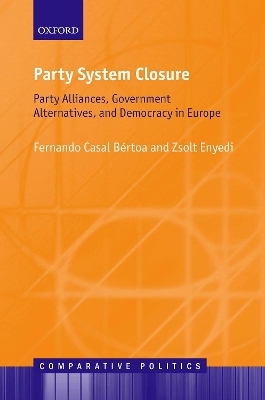
Party System Closure
Oxford University Press (Verlag)
978-0-19-882360-5 (ISBN)
Party System Closure maps trends in interparty relations in Europe from 1848 until 2019. It investigates how the length of democratic experience, the institutionalization of individual parties, the fragmentation of parliaments, and the support for anti-establishment parties, shape the degree of institutionalization of party systems. The analyses presented answer the questions of whether predictability in partisan interactions is necessary for the survival of democratic regimes and whether it improves or undermines the quality of democracy. The developments of party politics at the elite level are contrasted with the dynamics of voting behaviour. The comparisons of distinct historical periods and of macro-regions provide a comprehensive picture of the European history of party competition and cooperation.
The empirical overview presented in the book is based on a novel conceptual framework and features party composition data of more than a thousand European governments. Party systems are analysed in terms of poles and blocs, and the degree of closure and of polarization is related to a new party system typology. The book demonstrates that information collected from partisan interactions at the time of government formation can reveal changes that characterise the party system as a whole.
The empirical results confirm that the Cold War period (1945-1989) was exceptionally stable, while the post-Berlin-Wall era shows signs of disintegration, although more at the level of voters than at the level of elites. After three decades of democratic politics in Europe (1990-2019), the West and the South are looking increasingly like the East, especially in terms of the level of party de-institutionalization. The West and the South are becoming more polarised than the East, but in terms of parliamentary fragmentation, the party systems of the South and the East are converging, while the West is diverging from the rest with its increasingly high number of parties. As far as our central concept, party system closure, is concerned, thanks to the gradual process of stabilization in the East, and the recent de-institutionalization in the West and South, the regional differences are declining.
Comparative Politics is a series for researchers, teachers, and students of political science that deals with contemporary government and politics. Global in scope, books in the series are characterised by a stress on comparative analysis and strong methodological rigour. The series is published in association with the European Consortium for Political Research. For more information visit: www.ecprnet.eu. The series is edited by Susan Scarrow, Chair of the Department of Political Science, University of Houston, and Jonathan Slapin, Professor of Political Institutions and European Politics, Department of Political Science, University of Zurich.
Fernando Casal Bértoa is an Associate Professor in the School of Politics and International Relations, University of Nottingham. He is co-director of REPRESENT: Research Centre for the Study of Parties and Democracy. His work has been published in numerous scholarly journals, such as the Journal of Politics, European Journal of Political Research, Sociological Methods and Research, Electoral Studies, West European Politics, Party Politics, European Political Science Review and Democratization. He was awarded the 2017 Gordon Smith and Vincent Wright Memorial Prize, the 2017 AECPA Prize for the Best Article and the 2018 Vice-Chancellor Medal of the University of Nottingham for 'exceptional achievements'. Zsolt Enyedi is Professor at the Political Science Department of Central European University. He (co)authored two and (co)edited eight volumes and published numerous articles and book chapters, mainly on party politics and political attitudes. His articles appeared in journals such as European Journal of Political Research, Political Studies, Political Psychology, West European Politics, Party Politics, Europe-Asia Studies, Perspectives on Politics, European Review, etc. He has received a number of academic awards such as the Rudolf Wildenmann Prize, 2003, Bibó Prize, 2004, and the Hungarian Academy Award 2020.
Introduction: A Systemic Approach to Inter-Party Relationships
1: The Logic of Inter-party Competition and Cooperation: Blocs, Poles, Institutionalization, and Closure
2: A New European Dataset and the Measurement of Party System Closure Data
3: Currently Functioning European Party Systems
4: Historical (i.e. Defunct) European Party Systems
5: Party System Closure in Comparative Perspective
6: From Time to Time: Democratic Age, Birth, and Closure
7: The Whole is More than the Sum of the Parts: Party Institutionalization and Closure
8: Size Does Matter: The Number of Parties and Closure
9: Pulling Apart: Polarization and Closure
10: The Explanatory Model of Closure: Factors and Mechanisms
11: Survival vs. Quality: Democratic Consequences of Closure
Conclusion: How Do Party Systems Institutionalize?
| Erscheinungsdatum | 13.07.2021 |
|---|---|
| Reihe/Serie | Comparative Politics |
| Verlagsort | Oxford |
| Sprache | englisch |
| Maße | 163 x 239 mm |
| Gewicht | 628 g |
| Themenwelt | Sozialwissenschaften ► Politik / Verwaltung ► Politische Systeme |
| Sozialwissenschaften ► Politik / Verwaltung ► Politische Theorie | |
| Sozialwissenschaften ► Politik / Verwaltung ► Staat / Verwaltung | |
| Sozialwissenschaften ► Politik / Verwaltung ► Vergleichende Politikwissenschaften | |
| ISBN-10 | 0-19-882360-6 / 0198823606 |
| ISBN-13 | 978-0-19-882360-5 / 9780198823605 |
| Zustand | Neuware |
| Informationen gemäß Produktsicherheitsverordnung (GPSR) | |
| Haben Sie eine Frage zum Produkt? |
aus dem Bereich


